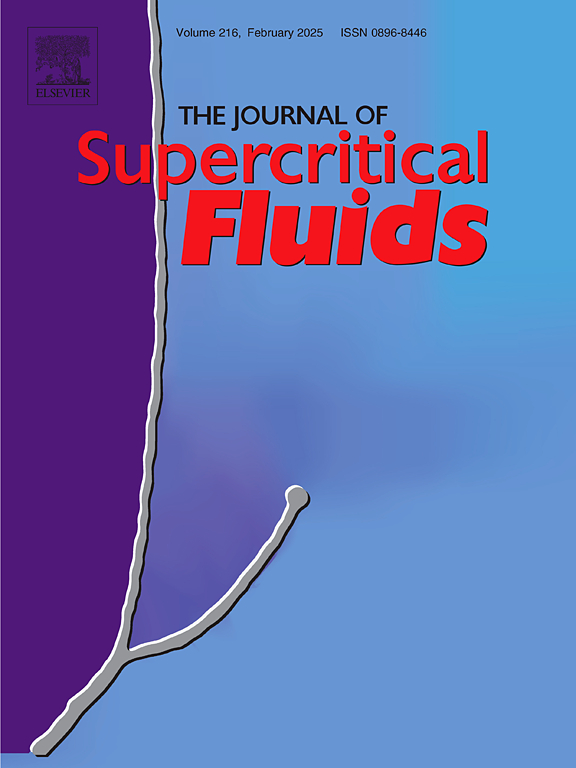Experimental study of phase-equilibrium properties of binary mixtures of supercritical solvents with the main component of asphaltene -resin- paraffin deposits for the preventing and removing inside oil wells
IF 4.4
3区 工程技术
Q2 CHEMISTRY, PHYSICAL
引用次数: 0
Abstract
The paper presents the results of the phase-equilibrium (VLE) study of the supercritical binary (n-butane/propane) mixture (as a supercritical solvent) with the main component (heavy n-alkane, n-tricosane, n-C23H48) of asphaltene-resin-paraffin (ARP) deposits. The isothermal VLE measurements were performed at three selected temperatures of (403.15, 423.15, and 443.15) K and at pressures of up to 7.3 MPa. The results have been used to study the process of cleaning oil wells of ARP deposits using a supercritical extraction process. The sample of ARP deposits was taken from the Orenburg oil field, characterized by a high content of paraffins (33.7 %), resins (30.55 %), and asphaltene (3.9 %). Heavy hydrocarbon extraction from ARP deposition was performed using a supercritical ready-to-use binary propane/n-butane mixture solvent in the temperature range of (398−433) K and at a pressure of (5−13) MPa. The kinetics of the propane/n-butane supercritical extraction process of hydrocarbons from ARP deposits under different thermodynamic conditions were studied. The present results can be used to prevent heavy oil component deposition in production oil wells.
以沥青质-树脂-石蜡为主要成分的超临界溶剂二元混合物在油井内防除的相平衡特性实验研究
本文介绍了以沥青质-树脂-石蜡(ARP)沉积物为主要组分(重正构烷烃、正三聚糖、正c23h48)的超临界二元(正丁烷/丙烷)混合物(作为超临界溶剂)的相平衡(VLE)研究结果。等温VLE测量在(403.15,423.15和443.15)K三个选定的温度和压力高达7.3 MPa下进行。并将研究结果应用于超临界萃取法清洗ARP沉积物油井的工艺研究。ARP沉积样品取自Orenburg油田,其特征是石蜡(33.7 %)、树脂(30.55 %)和沥青质(3.9 %)含量高。在温度为(398 ~ 433)K、压力为(5 ~ 13)MPa的条件下,采用超临界丙烷/正丁烷二元混合物萃取ARP沉积中的重烃。研究了不同热力学条件下ARP沉积物中丙烷/正丁烷超临界萃取烃类的动力学。研究结果可用于防止生产油井中稠油组分沉积。
本文章由计算机程序翻译,如有差异,请以英文原文为准。
求助全文
约1分钟内获得全文
求助全文
来源期刊

Journal of Supercritical Fluids
工程技术-工程:化工
CiteScore
7.60
自引率
10.30%
发文量
236
审稿时长
56 days
期刊介绍:
The Journal of Supercritical Fluids is an international journal devoted to the fundamental and applied aspects of supercritical fluids and processes. Its aim is to provide a focused platform for academic and industrial researchers to report their findings and to have ready access to the advances in this rapidly growing field. Its coverage is multidisciplinary and includes both basic and applied topics.
Thermodynamics and phase equilibria, reaction kinetics and rate processes, thermal and transport properties, and all topics related to processing such as separations (extraction, fractionation, purification, chromatography) nucleation and impregnation are within the scope. Accounts of specific engineering applications such as those encountered in food, fuel, natural products, minerals, pharmaceuticals and polymer industries are included. Topics related to high pressure equipment design, analytical techniques, sensors, and process control methodologies are also within the scope of the journal.
 求助内容:
求助内容: 应助结果提醒方式:
应助结果提醒方式:


